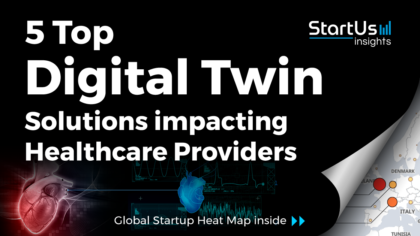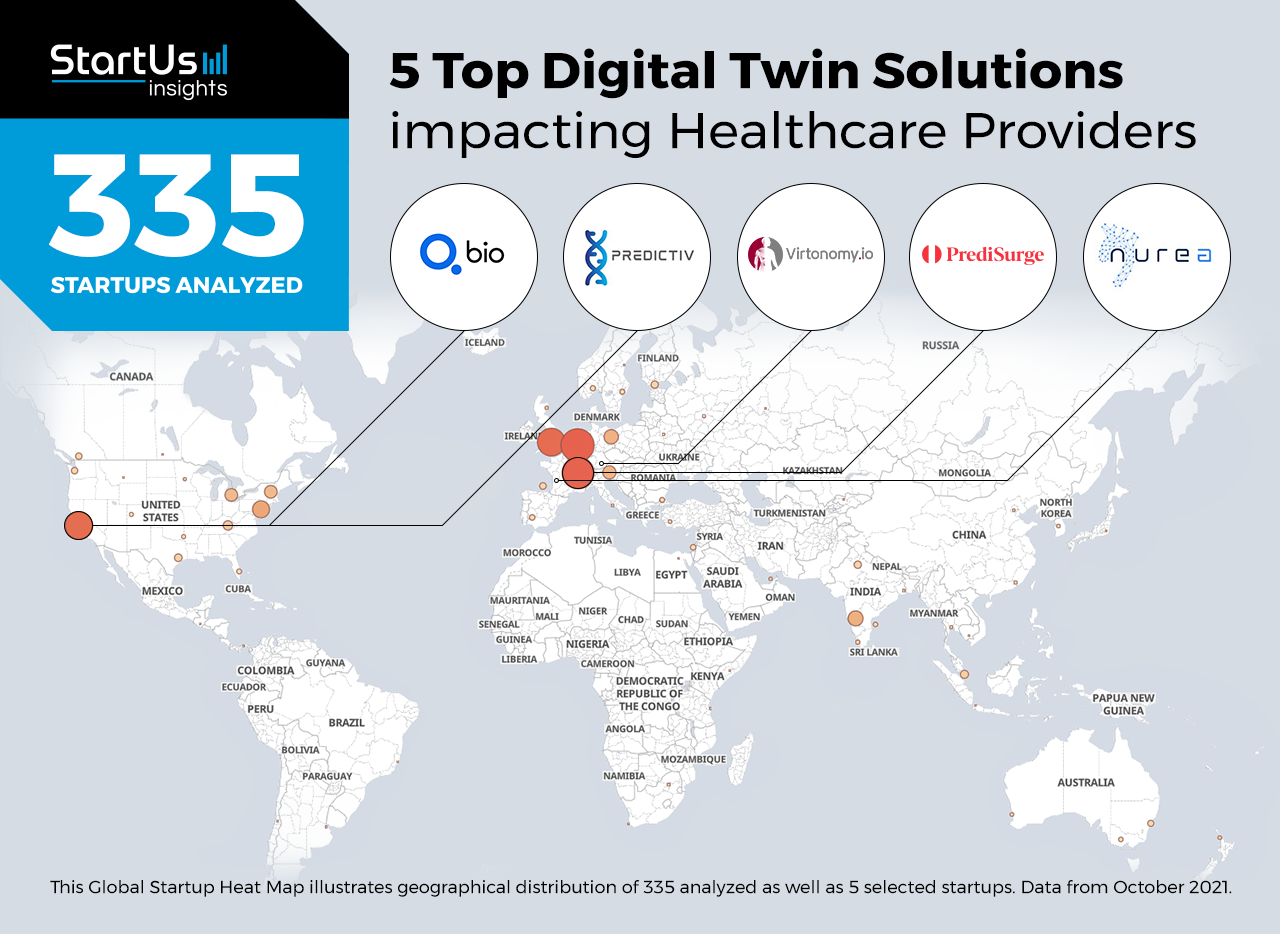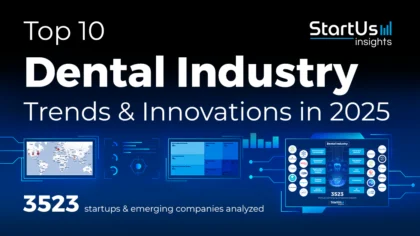Staying ahead of the technology curve means strengthening your competitive advantage. That is why we give you data-driven innovation insights into the healthcare sector. This time, you get to discover 5 hand-picked digital twin solutions impacting healthcare providers.
Out of 335, the Global Startup Heat Map highlights 5 Top Digital Twin Solutions impacting Healthcare Providers
The insights of this data-driven analysis are derived from the Big Data & Artificial Intelligence-powered StartUs Insights Discovery Platform, covering 2 093 000+ startups & scaleups globally. The platform gives you an exhaustive overview of emerging technologies & relevant startups within a specific field in just a few clicks.
The Global Startup Heat Map below reveals the distribution of the 335 exemplary startups & scaleups we analyzed for this research. Further, it highlights 5 startups that we hand-picked based on criteria such as founding year, location, funding raised, and more. You get to explore the solutions of these 5 startups & scaleups in this report. For insights on the other 330 digital twin solutions for healthcare, get in touch.
NUREA designs a Medical Imaging Software
Aortic aneurysm is a complicated cardiovascular disease that ruptures and causes internal bleeding between artery walls. Normally, patients need to undergo multiple computed tomography (CT) or magnetic resonance imaging (MRI) scans to examine the degree of the aortic aneurysm. However, this increases the risk of radiation exposure, making the treatment complicated. This is why startups are developing digital twins that drive decisions based on virtual models.
French startup NUREA designs, develops, and markets artificial intelligence (AI)-based digital twin imaging software for cardiovascular surgeons. This software enables automated 3D reconstruction of the patient-specific digital vascular twins from CT angiograms. Surgeons use this software to visualize the evolution of the aortic aneurysm using geometrical data. This solution enables surgeons to make treatment decisions as early as possible, in turn, lowering the severity of the disease.
PrediSurge offers Patient Anatomy Simulations
Medical implants, especially stent grafts, are common in cardiovascular surgeries. However, a slight change in the physics or material properties of stent-grafts negatively affects the outcome of the treatment. To this end, startups are creating 3D simulations of patient anatomies to predict intervention proceedings and possible outcomes.
French startup PrediSurge provides simulation technology to create digital twins of patient anatomies. Using medical images, the startup generates 3D models of patient-specific anatomy. Then, surgeons select the digital models of desired medical implants from their database to run automated numerical simulations of the intervention. These simulations assist surgeons in making more accurate decisions. In addition, the solution delivers customized and optimized care to patients.
Predictiv enables Genetic Disorder Prediction
For each organism, DNA is a complex and information-loaded building block of cells. Using DNA to create digital twins allows scientists to plan personalized medical treatments for an individual. This, in turn, makes any future issues predictable and also preventable. Although digital twin technology is still evolving, it already advances medical and surgical applications through virtual trials to improve patient safety.
US-based startup Predictiv predicts occurrences of serious and genetic disorders in an individual using their DNA-based digital twin. The startup collects an individual’s fingernails to extract their DNA and build digital twins. They then prepare a genetic risk assessment report and provide preventive healthcare plans personalized for each individual.
Q Bio develop Whole Body Digital Twins
To assist medical professionals, patients are often recommended to undergo whole-body scans that provide more accurate diagnosis and treatment options. However, these scans use large amounts of radiation which may increase the risk of cancer and are also relatively expensive. Therefore, newer technologies like digital twins or AI-based screenings are introduced. They provide a more comprehensive and safer way of diagnosis and are also more accessible to patients.
US-based startup Q Bio builds a clinical digital twin platform called the Q Bio Gemini. The software is powered by the Q Bio Mark 1 whole-body scanner. It scans a person’s body in around 15 minutes without causing any risk of radiation or claustrophobia. The platform also provides detailed real-time insights through dashboards that are securely shared with medical professionals. These features make the entire body scanning process safer for patients and also allow doctors to receive detailed reports in real-time.
Virtonomy.io provides Virtual Medical Device Testing
The demand for new and more effective medical equipment, as well as medicines, is increasing. At the same time, the development costs are rising along in terms of time-to-market and profitability. These further limit access to life-saving treatments for millions of patients around the world. The introduction of technology-based alternatives to test medical devices addresses such issues by eliminating human trials in the development phase while making the process cost-effective, fast, and safe.
German startup Virtonomy.io is transforming clinical trials of medical devices by developing virtual patients, for both animals and humans, using their data-driven platform. The startup uses multiple technologies like digital twins, statistical analytics, simulation, and more to create virtual patients, v-Patients. These simulations mimic the anatomy of people which later assists medical equipment manufacturers. This also replaces clinical evidence with digital evidence throughout the product development lifecycle, making it less expensive and more resource-efficient.
Discover more Healthcare Startups
Healthcare startups such as the examples highlighted in this report focus on artificial intelligence, machine learning, and numerical simulations. While all of these technologies play a major role in advancing the healthcare industry, they only represent the tip of the iceberg. To explore more healthcare technologies, simply get in touch to let us look into your areas of interest. For a more general overview, you can download our free Healthcare Innovation Report to save your time and improve strategic decision-making.



![Discover the Top 10 Trends in Precision Medicine [2025]](https://www.startus-insights.com/wp-content/uploads/2025/05/Precision-Medicine-Trend-SharedImg-StartUs-Insights-noresize-420x236.webp)
![Discover the Top 10 AI Trends in Healthcare [2025]](https://www.startus-insights.com/wp-content/uploads/2025/04/AI-Trends-in-Healthcare-SharedImg-StartUs-Insights-noresize-420x236.webp)




